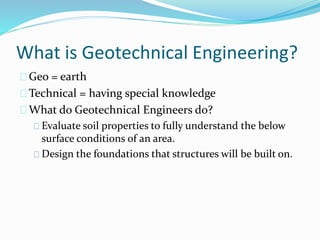The Best Guide To Geotheta
The Best Guide To Geotheta
Blog Article
Some Ideas on Geotheta You Need To Know
Table of ContentsUnknown Facts About GeothetaGeotheta - The FactsGeotheta for BeginnersGeotheta for BeginnersThe Only Guide for Geotheta

They carry out website investigations, collect examples, do research laboratory examinations, and examine information to assess the suitability of the ground for building and construction jobs - Consulting Engineers. Based on their findings, geotechnical designers give referrals for foundation style, incline security, retaining structures, and mitigation of geotechnical risks. They collaborate with various other specialists, such as architects, structural engineers, and construction groups, to ensure that geotechnical considerations are integrated into the general task layout and execution
By evaluating the actions and homes of dirt and rock, they can recognize potential geotechnical hazards such as landslides, soil negotiation, or slope instability. Their competence helps stop failures or mishaps that could threaten lives and home. Below are some detailed obligations and duties of a geotechnical engineer: Site Investigation: Geotechnical designers conduct website investigations to collect information on subsurface conditions.
They translate the information to comprehend the buildings and behavior of the soil and rock, including their stamina, leaks in the structure, compaction characteristics, and groundwater conditions. Geotechnical Analysis and Design: Geotechnical designers assess the data accumulated throughout site investigations to examine the stability and suitability of the site for building tasks. They do geotechnical estimations and modeling to review elements such as birthing capability, negotiation, slope security, side earth stress, and groundwater circulation.
Some Ideas on Geotheta You Need To Know
Structure Layout: Geotechnical engineers play a vital duty in making foundations that can safely support the desired framework. They examine the soil problems and lots demands to establish the appropriate structure type, such as shallow structures (e.g., footings), deep foundations (e.g (https://sketchfab.com/geotheta)., stacks), or specialized strategies like dirt enhancement. They think about elements such as settlement restrictions, birthing capacity, and soil-structure interaction to create optimal structure styles
They review building plans, screen site tasks, and conduct field evaluations to validate that the layout suggestions are followed. If unforeseen geotechnical issues occur, they analyze the circumstance and offer referrals for remediation or changes to the design. Threat Evaluation and Reduction: Geotechnical engineers evaluate geotechnical risks and dangers connected with the project website, such as landslides, liquefaction, or dirt erosion.

Partnership and Communication: Geotechnical designers work very closely with various other experts associated with a task, such as engineers, structural engineers, and building and construction groups. Efficient communication and cooperation are vital to integrate geotechnical considerations right into the overall project style and construction process. Geotechnical designers give technological competence, solution queries, and guarantee that geotechnical demands are fulfilled.
Geotheta - The Facts
Below are some kinds of geotechnical designers: Foundation Designer: Structure designers concentrate on designing and assessing foundations for structures. They assess the soil conditions, tons requirements, and site features to identify the most suitable structure kind and layout, such as shallow foundations, deep foundations, or specialized techniques like pile foundations.
They evaluate the aspects affecting incline stability, such as dirt residential properties, groundwater problems, and slope geometry, and establish approaches to stop incline failings and alleviate threats. Quake Engineer: Quake engineers specialize in evaluating and designing frameworks to hold up against seismic forces. They examine the seismic hazard of a site, assess soil liquefaction potential, and develop seismic style criteria to ensure the safety and durability of frameworks throughout earthquakes.
They do field screening, accumulate samples, and evaluate the accumulated information to identify the soil residential or commercial properties, geologic formations, and groundwater problems at a website. Geotechnical Instrumentation Designer: Geotechnical instrumentation engineers concentrate on tracking and measuring the habits of dirt, rock, and frameworks. They mount and maintain instrumentation systems that keep an eye on aspects such as soil negotiation, groundwater degrees, incline motions, and structural displacements to evaluate performance and give very early cautions of possible concerns.
The Ultimate Guide To Geotheta
They carry out examinations such as triaxial examinations, consolidation examinations, straight shear examinations, and leaks in the structure examinations to collect data for geotechnical analysis and design. Geosynthetics Engineer: Geosynthetics designers focus on the layout and application of geosynthetic materials, such as geotextiles, geogrids, and geomembranes. They make use of these materials to improve dirt security, enhance inclines, offer water drainage remedies, and control disintegration.
They have a tendency to be investigative people, which indicates they're intellectual, introspective, and inquisitive. They wonder, systematic, reasonable, analytical, and rational. Some of them are likewise social, implying they're kind, charitable, participating, patient, caring, useful, understanding, tactful, and pleasant. Does this noise like you? Take our free job examination to discover out if geotechnical engineer is one of your leading occupation matches.
In the workplace environment, geotechnical engineers utilize specialized software application tools to carry out computations, produce layouts, and examine information. They prepare records, evaluation task specs, interact with clients and employee, and coordinate project tasks. The office setup offers a helpful setting for study, evaluation, and partnership with various other experts associated with the job.
Geotheta Things To Know Before You Get This
They frequently go to project websites to carry out site investigations, assess geotechnical conditions, and gather information for analysis. These sees involve traveling to various areas, occasionally in remote or challenging terrains. Geotechnical engineers might perform dirt sampling, conduct tests, and monitor construction tasks to make certain that the geotechnical aspects of the task are being implemented appropriately.
Geotechnical engineers also function in specialized geotechnical labs. Geotechnical lab designers function extensively in these settings, taking care of screening equipment, running instruments, and recording data.
Report this page